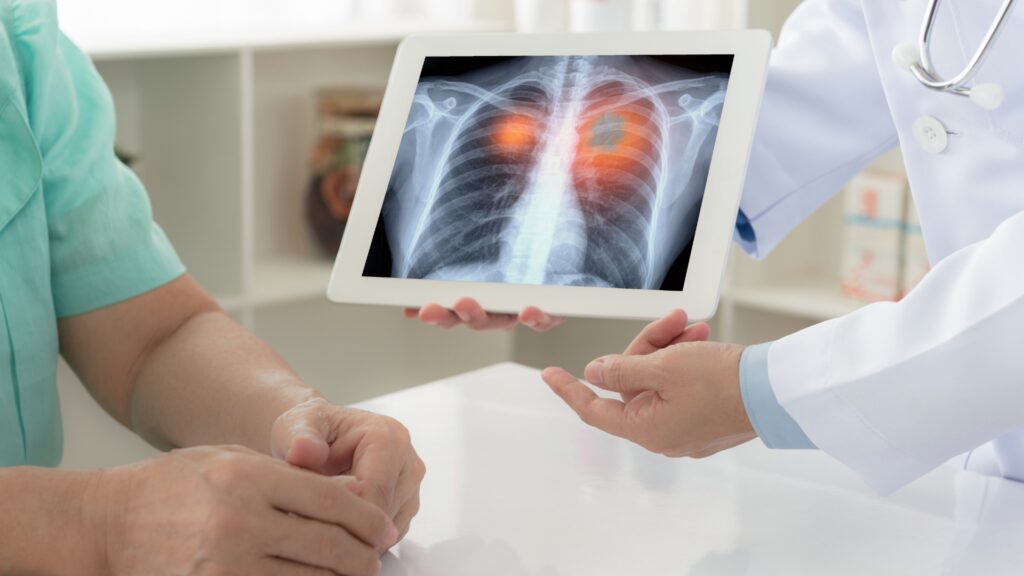Understanding Lung Cancer
Understanding Lung cancer is a type of cancer that begins in the lungs. It is one of the leading causes of cancer-related deaths worldwide, affecting both men and women. There are two main types of lung cancer: non-small cell lung cancer (NSCLC) and small cell lung cancer (SCLC). Early detection and treatment are crucial for improving the prognosis and survival rates for lung cancer patients.
Causes and Risk Factors
The primary cause of lung cancer is smoking, but it can also occur in non-smokers due to other risk factors. Here are the main causes and risk factors associated with lung cancer:
- Smoking: The leading cause of lung cancer. The risk increases with the number of cigarettes smoked and the duration of smoking.
- Secondhand Smoke: Exposure to secondhand smoke also increases the risk of lung cancer.
- Radon Gas: A naturally occurring radioactive gas that can accumulate in homes and increase the risk of lung cancer.
- Asbestos and Other Carcinogens: Exposure to asbestos, arsenic, chromium, nickel, and other carcinogens can increase the risk.
- Air Pollution: Long-term exposure to polluted air can increase the risk of lung cancer.
- Family History: A family history of lung cancer can increase the risk.
- Previous Radiation Therapy: People who have undergone radiation therapy to the chest for other cancers have an increased risk.
Signs and Symptoms
Lung cancer often does not cause symptoms in its early stages. When symptoms do occur, they can include:
- Persistent cough that worsens over time
- Coughing up blood or rust-colored sputum
- Shortness of breath
- Chest pain that worsens with deep breathing, coughing, or laughing
- Hoarseness
- Unexplained weight loss
- Loss of appetite
- Fatigue
- Recurrent infections such as bronchitis or pneumonia
- New onset of wheezing
Prevention
Preventing lung cancer involves several strategies, especially for those at higher risk:
- Quit Smoking: The most effective way to reduce the risk of lung cancer. Seek help if needed to quit smoking.
- Avoid Secondhand Smoke: Stay away from environments where people are smoking.
- Test for Radon: Check your home for radon levels and take steps to reduce exposure if necessary.
- Avoid Carcinogens: Take precautions to avoid exposure to known carcinogens at work and at home.
- Eat a Healthy Diet: A diet rich in fruits and vegetables can support overall health and may help reduce the risk.
- Exercise Regularly: Regular physical activity can help improve lung function and overall health.
Plants That Could Help
Certain plants and herbs are believed to have properties that may support lung health and help reduce cancer risk:
- Turmeric: Contains curcumin, which has anti-inflammatory and antioxidant properties.
- Green Tea: Rich in polyphenols and antioxidants that may help prevent cancer cell growth.
- Ginger: Known for its anti-inflammatory and antioxidant effects.
- Garlic: Contains compounds that may help boost the immune system and have anti-cancer properties.
Supplements That Could Help
In addition to a healthy diet, certain supplements may support lung health and help manage symptoms:
- Vitamin D: Essential for immune function and may reduce cancer risk.
- Vitamin C: An antioxidant that supports the immune system.
- Omega-3 Fatty Acids: Anti-inflammatory properties that may help prevent cancer.
- Selenium: A mineral with antioxidant properties that may help protect cells from damage.
- N-acetylcysteine (NAC): An antioxidant that supports lung health by reducing oxidative stress.
Healthy Tips
Implementing these tips can further help prevent and manage lung cancer:
- Stay Informed: Keep up-to-date with the latest research and guidelines on lung cancer prevention.
- Regular Checkups: Visit your healthcare provider regularly for screenings and checkups.
- Self-Care: Practice stress-reducing techniques such as yoga, meditation, or deep breathing exercises.
- Maintain a Healthy Lifestyle: Eat a balanced diet, exercise regularly, and avoid known risk factors.
- Monitor Symptoms: Be aware of any changes in your health and seek medical advice if you experience symptoms associated with lung cancer.
References
- American Cancer Society. (2023).
- Mayo Clinic. (2023).
- National Cancer Institute. (2023).

Suleiman Atieh, experienced pharmacist specializing in healthcare, patient wellness, safe medication practices, disease management, and supplement guidance.








